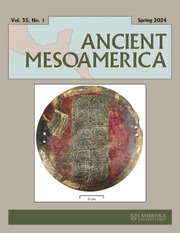Article contents
The Role of Architectural Sculpture in Ritual Space at Teotihuacan, Mexico
Published online by Cambridge University Press: 10 October 2008
Abstract
This article presents an analysis of the role played by architectural sculpture in creating directional focus in the buildings and plazas of Teotihuacan, Mexico. The sculptural programs of the Pyramid of the Feathered Serpent and the Palace of the Sacred Birds, one early in the city's building history, and the other late, are compared. Architectural form and decoration are shown to work together to engage the viewer and to manipulate the viewer's relationship to sacred and elite space.
- Type
- Special Section: Imagery and Notation at Teotihuacan
- Information
- Copyright
- Copyright © Cambridge University Press 1991
References
REFERENCES
- 4
- Cited by


